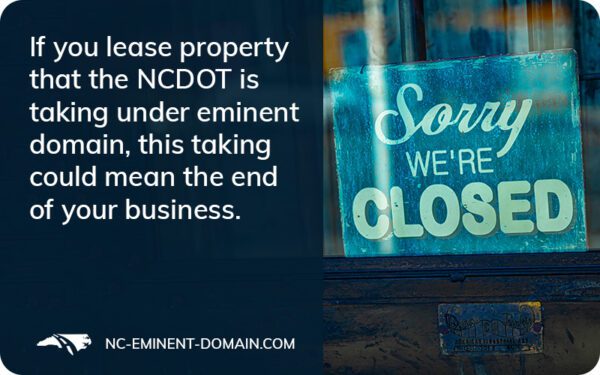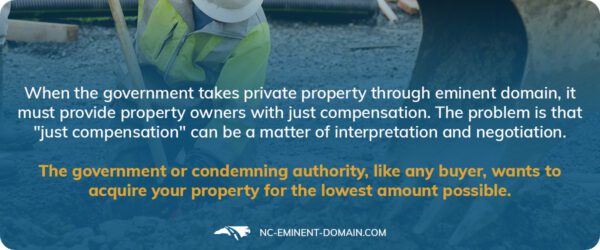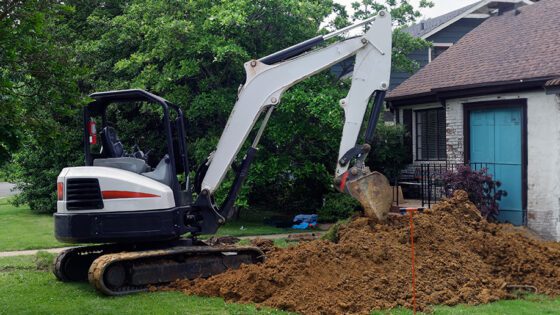When the government takes property for a public use under eminent domain, impacted property owners are entitled to just compensation.
Many business owners, however, lease the space they operate their business from. If you lease property that the NCDOT is taking under eminent domain, this taking could mean the end of your business.

But we have seen the NCDOT use this argument as a one-size-fits-all solution to the question regarding leases. However, in some cases, you may be entitled to eminent domain payment for property you lease but do not own.
Let’s talk about how the eminent domain compensation process usually works, and how eminent domain law applies for lease tenants.
How eminent domain works
The Fifth Amendment allows the federal government as well as state and local governments to take private property away from you, the property owner, for public use projects. Examples include when a government agency such as a department of transportation needs to widen a highway or a public utility needs to build utility poles.
When the government takes private property through eminent domain, it must provide property owners with just compensation. The problem is that “just compensation” can be a matter of interpretation and negotiation. The government or condemning authority, like any buyer, wants to acquire your property for the lowest amount possible.

This is how eminent domain payment usually works for property owners, but things become even more complex when the situation involves an eminent domain taking of leased space.
It may be possible to negotiate eminent domain payment for the taking of leased property
No argument is one-size-fits-all and many are potentially negotiable – even when the NCDOT says it is not. You just need to know what to ask for, the right experts to help you ask for it, and try to prove your case. Sometimes, a successful outcome is dependent on having the right technological and staffing resources at your disposal. And sometimes you have to get creative in your thinking and research, as we had to do for two business partners who leased space for one of their KFC restaurants.
You may be entitled to eminent domain payment for property you lease
These business partners were involved in a highly complex eminent domain scenario, for which the NCDOT said they had no legal claim to compensation. Technically they were correct. Despite that technicality, the complexity of their situation, and the NCDOT’s denial of compensation, we were able to convince them to compensate these lessors1.
Since we’ve been in business, we have increased the average offer for our clients by 197.%1
One of the business partners acknowledged just how complex the situation was. “We had a long-term lease, and then we had subleased a portion of the property to another tenant. So the tenant was paying us rent. We were paying the landlord rent. It got very complicated,” he explained.
Your lease agreement may determine how much eminent domain compensation you can receive
If you have a lease or a lessor, and the property is condemned, it is important to check the lease to see if and how it divvies up just compensation between the landlord and tenant. Some leases give it all to the landlord. Some to the tenant. Some leases divide between the two. And some leases are silent, leaving the issue for the court and jury to decide.
In the KFC case the lease was silent. So the NCDOT ignored the KFC tenant and tried to pay only the landlord. But this lease had significant market value to the tenant. We were able to force our way to the table and present a cogent argument that cut through the entanglement of eminent domain laws surrounding leases in North Carolina.
We were able to successfully1:
- Intervene in the condemnation regarding property our clients did not own.
- Develop our own legal theory in the absence of North Carolina legal precedents or provisions in the lease that applied to our clients’ unique situation.
- Find a critical resource at the 11th hour, just before trial, that supported our position, after scouring North Carolina and U.S. legal databases for established precedents and finding none. (That resource? An appraisal textbook.)
- Negotiate separate deals with the NCDOT for all parties – our client, our client’s landlord, and our client’s sub-lessor.
The NCDOT ended up fairly and substantially compensating our KFC clients for its lost lease.1
Fight for an eminent domain payment that’s truly just compensation
Of course, each situation needs to be evaluated separately, but if your lease does not have a condemnation clause, then you may potentially be entitled to compensation for your costs to relocate and for the fair market value of your lease. Generally, the fair market value of your lease is the difference between your current lease cost and the cost to lease a new location.
Get your free case evaluation from NC Eminent Domain lawyers
If you are faced with an eminent domain taking, contact us. Since we’ve been in business, we have increased the average offer for our clients by 208.1%.1
An experienced NC Eminent Domain Law Firm attorney (several of whom used to work as NCDOT assistant attorneys general) may be able to help you fight for compensation for your leased space. Contact us today or call 1-877-393-4990.



